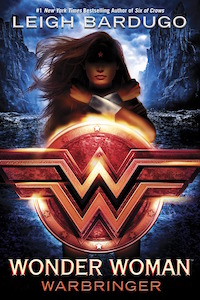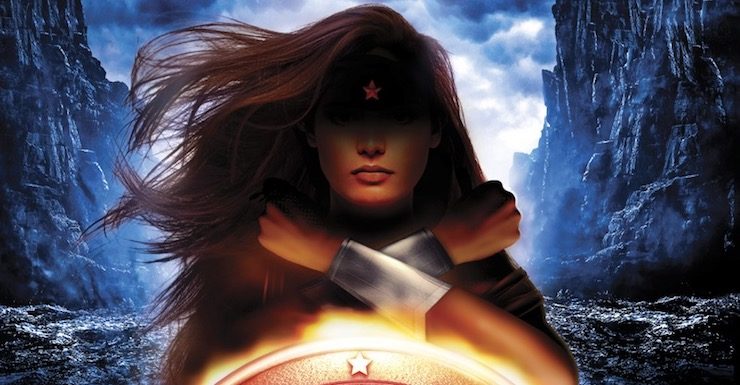This is the summer of Wonder Woman, thanks to her runaway hit movie and her outsize role in our ongoing debate over female heroes in pop culture. But they’ve saved the best treat for last: bestselling YA author Leigh Bardugo just published a Wonder Woman novel called Warbringer, and it’s everything I ever wanted from Diana.
Minor spoilers follow.
Wonder Woman shares the same problem as a lot of other longstanding comic-book heroes—her backstory has gotten convoluted, thanks to endless reboots, and no two writers ever seem to agree about where she’s come from and why she’s chosen to leave the island of Amazons to visit the outside world. Patty Jenkins’ movie did a good job of preserving the best of various takes on the character (but keeps the controversial trend in recent comics towards Wonder Woman being the daughter of Zeus.)
But Bardugo’s Wonder Woman: Warbringer not only synthesizes a coherent origin and mission statement for Diana, but also makes the Amazon princess feel so fresh that she could have been created yesterday. Bardugo crafts a coming-of-age story for Diana of Themyscira that turns her into a fascinating character who has to earn her heroic mantle.
For starters, Bardugo finds a clever twist on Wonder Woman’s classic beginning. Instead of Steve Trevor washing ashore on the all-female island of Themyscira, the interloper is a teenage girl named Alia Keralis. But she’s still an outsider, and she’s connected to a terrible curse from Greek mythology, and her very presence is poisoning the island and making some of the Amazons sick. The fact that Diana chooses to save this drowning victim endangers her home, creating much more interesting stakes.
And it also helps that Bardugo has adjusted the foundations of Amazon society, building on ideas from writer-artist George Pérez and others. Bardugo’s Amazons include girls who are Diana’s own age, who died during recent wars in the outside world, rather than back during the era of gods and monsters. This gives Diana some meaningful friendships on Themyscira, and also means that when she leaves the island, she knows something about the outside world and her “fish out of water” storyline isn’t just her not understanding basic stuff.
I won’t give away what happens after Diana chooses to save Alia, rather than letting her die, as an Oracle tells her to. Suffice to say, there’s an epic quest, and Diana has to grapple with the nature of war, and the world is nearly plunged into darkness. But Bardugo finds ways to keep the conflict personal and human-scale, thanks to Diana’s growing friendship with Alia, and the complicated relationships with Alia’s supporting cast.
And that supporting cast is a huge part of why Warbringer is such a delight. Wonder Woman has always been at her best when she has other women and girls to talk to, and when she’s surrounded by a diverse group of people who bring different perspectives. So Alia, a young nerd whose parents were of Greek and African descent, provides a great entry point to a world that also includes Poornima “Nim” Chaudhary, a hyperactive young fashion designer who likes girls, and Theo Santos, the sarcastic science geek on whom Alia has a secret crush. Bardugo uses chapters in Alia’s point of view to ground the mythic adventure in our world, touching in clever ways on race, culture, and the impossibility of ever living up to people’s expectations.
By the time the story reaches its boiling point and Diana has to make some impossible choices, we’ve spent enough time with the non-Amazon characters that the story still feels small and personal even when the stakes become ginormous. It’s the same trick that a lot of the best young adult novels use—like at the end of The Hunger Games, where Katniss is only concerned with finding a way to save Peeta’s life, but her choice has huge, far-reaching consequences.
The failure mode of Wonder Woman stories often looks a bit like the 2010 reboot of Clash of the Titans. Big sanitized versions of Greek mythology, and gods and heroes in silly costumes standing around saying things like, “Release the Kraken!” Which is fine, as long as there’s lots of insane spectacle and over-the-top action. Or you can go the route of Xena: Warrior Princess, which used its Greek mythological elements in the campiest, most ludicrous fashion, while taking its characters seriously.
And Wonder Woman, herself, is frequently portrayed as just another hero in a big costume, standing around declaiming. Christopher Priest, the writer who helped revitalize Black Panther 20 years ago, and gave Black Panther his all-female bodyguards, the Dora Milaje, says Wonder Woman and Black Panther have a lot in common. They’re both frequently portrayed as “stiffs.” (Also, they both come from “foreign” cultures, are both members of their respective royal families, and neither of them can ever be shown as weak or selfish, because of what they represent as symbols.) Priest managed to create a compelling version of T’Challa, in part because he didn’t have the million-dollar merchandising campaign that Wonder Woman has.
So it’s a joy to see Leigh Bardugo create a Diana who feels so alive and passionate, and Bardugo keeps finding ways to ground Diana’s desire to stop a war and prove herself as an Amazon. A big part of Bardugo’s success comes from bringing the human element back to the Greek myths—in part by correcting a lot of common misconceptions about mythology, and in part by avoiding too many endless scenes involving big costumes and shouting. Without giving too much away, Bardugo doesn’t throw in the “Wonder Woman fights Ares in a silly helmet” scene that so many Wonder Woman stories, including the recent movie, feel obligated to deliver.
 This is a uniquely young adult version of Wonder Woman, recasting her origin as a YA story about finding yourself and making unlikely new friends. Like a lot of the best YAs, Warbringer threads in big questions about what it means to be mortal, whether progress is unalloyedly good, the nature of violence, and whether it’s better to turn your back on such a messed-up world, while staying focused on the relationships at the heart of the story.
This is a uniquely young adult version of Wonder Woman, recasting her origin as a YA story about finding yourself and making unlikely new friends. Like a lot of the best YAs, Warbringer threads in big questions about what it means to be mortal, whether progress is unalloyedly good, the nature of violence, and whether it’s better to turn your back on such a messed-up world, while staying focused on the relationships at the heart of the story.
Could Bardugo’s YA approach to Wonder Woman carry forward into the grown-up version of the character? I think so, and I’m dying to see her, or someone else, try.
Wonder Woman: Warbringer is available from Random House.
 Before writing fiction full-time, Charlie Jane Anders was for many years an editor of the extraordinarily popular science fiction and fantasy site io9.com. Her debut novel, the mainstream Choir Boy, won the 2006 Lambda Literary Award and was shortlisted for the Edmund White Award. Her Tor.com story “Six Months, Three Days” won the 2013 Hugo Award and was optioned for television. Her debut SFF novel All the Birds in the Sky, won the 2016 Nebula Award in the Novel category and earned praise from, among others, Michael Chabon, Lev Grossman, and Karen Joy Fowler. She has also had fiction published by McSweeney’s, Lightspeed, and ZYZZYVA. Her journalism has appeared in Salon, the Wall Street Journal, Mother Jones, and many other outlets.
Before writing fiction full-time, Charlie Jane Anders was for many years an editor of the extraordinarily popular science fiction and fantasy site io9.com. Her debut novel, the mainstream Choir Boy, won the 2006 Lambda Literary Award and was shortlisted for the Edmund White Award. Her Tor.com story “Six Months, Three Days” won the 2013 Hugo Award and was optioned for television. Her debut SFF novel All the Birds in the Sky, won the 2016 Nebula Award in the Novel category and earned praise from, among others, Michael Chabon, Lev Grossman, and Karen Joy Fowler. She has also had fiction published by McSweeney’s, Lightspeed, and ZYZZYVA. Her journalism has appeared in Salon, the Wall Street Journal, Mother Jones, and many other outlets.










